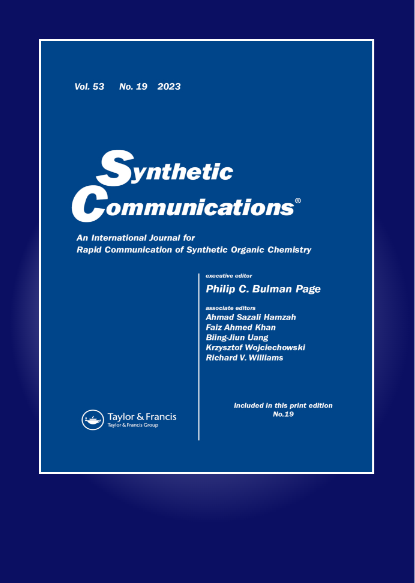Synthesis of new bis(pyrazolo[1,5-a]pyrimidines) linked to different spacers with potential MurB inhibitory activity utilizing 1H-pyrazole-3,5-diamines
IF 1.8
3区 化学
Q3 CHEMISTRY, ORGANIC
引用次数: 0
Abstract
Recently, there has been an increased interest in developing new antibacterial agents that target the MurB inhibition, which is necessary for bacterial survival. We developed a two-step tandem protocol to synthesize 15 new bis(pyrazolo[1,5-a]pyrimidines), which are attached to alkane cores by amide linkages. The protocol involved reacting the appropriate bis(2-cyanoacetamides) with dimethylformamide-dimethylacetal in toluene at 80 °C for 3-4 h. The crude bis(2-cyano-3-(dimethylamino)acrylamides) was collected, then reacted with 3,5-diamino-1H-pyrazoles. The reaction gave the desired products in 82-92% yields after 5-6 h of heating at reflux in pyridine. Bis(2,7-diamino-3-(4-methoxybenzyl)pyrazolo[1,5-a]pyrimidine-6-carboxamides) demonstrated comparable efficacy to ciprofloxacin. Their MIC and MBC ranged from 2.8-3.0 and 5.7-6.0 µM, respectively, against S. aureus and E. coli. Moreover, these products displayed promising MurB inhibitory activity with IC50 ranging from 7.8 to 8.0 µM.
利用1h -吡唑-3,5-二胺合成具有潜在MurB抑制活性的连接不同间隔物的新型双(吡唑[1,5-a]嘧啶
最近,人们对开发针对MurB抑制的新型抗菌剂越来越感兴趣,这是细菌生存所必需的。我们开发了一个两步串联方案来合成15个新的双(pyrazolo[1,5-a]嘧啶),它们通过酰胺键连接在烷烃核上。该方案涉及适当的双(2-氰乙酰胺)与二甲基甲酰胺-二甲基缩醛在80℃的甲苯中反应3-4小时。收集粗制的二(2-氰基-3-(二甲氨基)丙烯酰胺,与3,5-二氨基- 1h -吡唑反应。在吡啶中回流加热5-6 h,反应收率为82-92%。双(2,7-二氨基-3-(4-甲氧基苄基)吡唑[1,5-a]嘧啶-6-羧酰胺)的疗效与环丙沙星相当。对金黄色葡萄球菌和大肠杆菌的MIC和MBC分别为2.8 ~ 3.0µM和5.7 ~ 6.0µM。此外,这些产品显示出良好的MurB抑制活性,IC50在7.8 ~ 8.0µM之间。
本文章由计算机程序翻译,如有差异,请以英文原文为准。
求助全文
约1分钟内获得全文
求助全文
来源期刊

Synthetic Communications
化学-有机化学
CiteScore
4.40
自引率
4.80%
发文量
156
审稿时长
4.3 months
期刊介绍:
Synthetic Communications presents communications describing new methods, reagents, and other synthetic work pertaining to organic chemistry with sufficient experimental detail to permit reported reactions to be repeated by a chemist reasonably skilled in the art. In addition, the Journal features short, focused review articles discussing topics within its remit of synthetic organic chemistry.
 求助内容:
求助内容: 应助结果提醒方式:
应助结果提醒方式:


